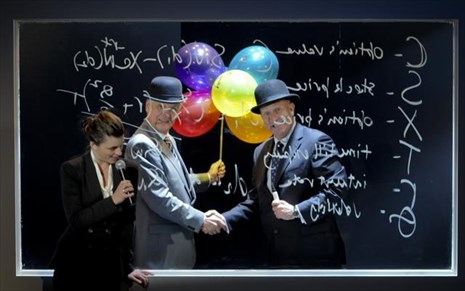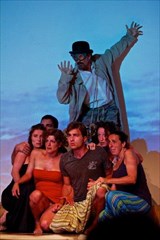Pictures: www.naftemporiki.gr
Is there a theatre about the global economic crisis? The European programme Culture "World Crisis Theatre" and Pandio University answer this question with a three-day festival, which will take place from 23 to 25 August at the Little Theatre of Ancient Epidaurus.
At the festival, groups that deal with art from five EU countries (Greece, Germany, Italy, France and Portugal) will perform plays with the global economic crisis as a central theme. The programme is dedicated to the display of social phenomena and issues of human behaviour that are a consequence of the on-going economic crisis in Europe. This cooperation is mainly aimed at the creation of tools for the transformation of the European identity through art.
The French beginning

''The Power of Yes''
The festival begins on Friday, 23 August with French theatre director Bruno Freysnet who will present an excerpt from the play "The Power of Yes" by award-winning British novelist, screenwriter and director Sir David Hear. The play was written in 2009 and was determined by the British press as "fascinating political documentary work" that "searches for all questions the answers of which we seek." This is a theatrical metaphor of a study which Hear has carried out on the impact of the economic crisis, and includes interviews with famous economic journalists and investors, such as George Soros.
The Greek "Cyclops"

Greece will take part with "Cyclops - Survival", written and directed by professor at Pandio University Yiagos Andreadis, the "soul" of the World Crisis Theatre Festival. This is a remake of Euripides 'Cyclops', the theme of which is cannibalism, not only in the literal sense, but mainly in political and social context, like the one everyone is experiencing in today's economic crisis. Serving this logic, actors Christos Efthimiou, George Moroyanis, Maria Papadimitriou and Kimon Rigopoulos will recreate the mythical creatures or today's suffering and struggling people.
The Italian offer

''Esposti a tutto''
On Saturday, 24 August, the day will begin with Italy and the play "Esposti a tutto", directed by Tommaso Telang and Francesco Dzhiufre. It is about a group of men and women who come from a country of the crisis and who are invited by Dante’s Charon to start a journey together to an unspecified place and time.
Discontent, need of beauty, curiosity and desire for a new utopia make them take this opportunity, forget about their previous 'me' and leave everything behind.
The Portuguese"Reply"
Portugal will continue the programme with "Reply." Hugo Miguel Coelho's text and staging will search through statements of sociologists, economists, journalists and politicians for an answer to the question "Do we still have time to change the course of things?".
The interactive German offer
"The Satyr Play" from Germany (written and directed by Katerina Kokkinos Kennedy and Andreas Vratsa District court) is a play that will close the third and final day of the festival. This is a satirical contact with the Eumenides, the last part of Aeschylus’s "Oresteia". This is an interactive performance that exposes the 'dirty laundry' of democracy, bureaucracy and the current crisis. Against the background of the court of Orestes, the collective initiative of Australia, the German Human Waste Theatre and a group of artists from Berlin will unite with the audience, who will act with the judges and mythic figures of the drama.
The shows, that start at 8 p.m., are free of charge.